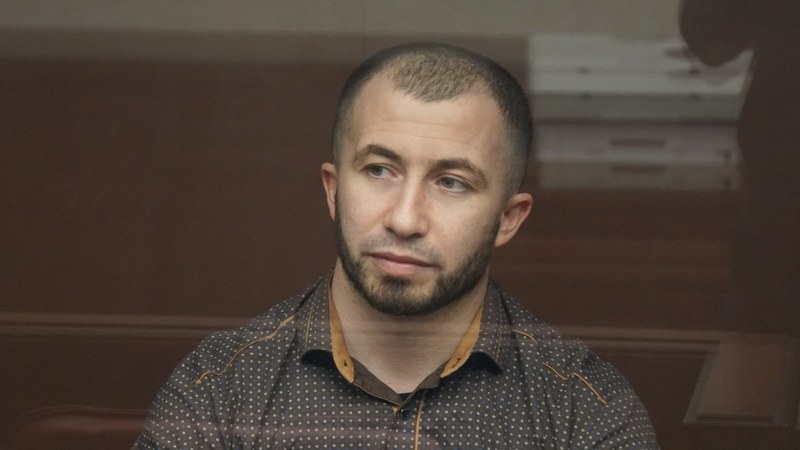• Topics / Human Rights Abuses in Russian-occupied Crimea
Russia’s insane trial of Crimean Tatar political prisoner Ismet Ibragimov 'borders on fantasy'

Neighbours of recognized Crimean Tatar political prisoner Ismet Ibragimov have expressed their bemusement at the indictment which borders, they say, on sheer fantasy. One of the men, Oleksandr Stepashkin, told the Russian court that he is a practising Christian and had never heard a word of criticism of Christians from Ismet, nor had the latter ever attempted to change his beliefs.
None of this would need to be stated except that the young father of three is facing a sentence of up to 20 years on ‘terrorism’ charges, based solely on unproven charges of involvement in the transnational Hizb ut-Tahrir Muslim organization, which Russia’s Supreme Court secretively, and without explanation, declared ‘terrorist’ back in 2003. Hizb ut-Tahrir is legal in Ukraine, and most countries, and Russia is in violation of international law by applying its legislation on illegally occupied Ukrainian territory. Ibragimov is not accused of having committed any recognizable offence, yet the FSB decided to apply the more serious charge of ‘organizing a Hizb ut-Tahrir group’ (Article 205.5 § 1 of Russia’s criminal code) and of “planning a violent seizure of power and change in Russia’s constitutional order” (Article 278).
In testifying before the court on 27 January 2022, both Stepashkin and Oleg Seitumerov stated that they had never seen anything to indicate that their neighbour was involved in any offences, nor had they heard calls from him to overthrow the Russian state order. Neither men had seen suspicious people gathering at Ibragimov’s home, and Stepashkin was quite certain that he would have seen such visitations had they actually taken place. During an earlier hearing on 20 January, Denis Zhukov also stated that Ibragimov had never promoted violence and had never suggested any plans to overthrow the regime. Nor had he ever expressed intolerance to other nationalities and faiths and had not spoken in favour of the ‘islamization of the Crimean population’ (as claimed). On the contrary, he said, Ibragimov was the sort of person he would happily entrust to take his children to and from school or similar.
Ibragimov turned 34 on 25 January 2022, imprisoned far from his wife and three daughters, in a Russian SIZO [remand prison]. He was working in construction when arrested, in order to support his family and is also an Arabic scholar.
He was one of seven men arrested on 7 July 2020, during one of the FSB’s armed ‘searches’ of 11 homes in different parts of occupied Crimea. The word ‘search’ can only be used very loosely since the armed men are known to have planted so-called ‘prohibited literature’ during several of these raids, including in the home of Oleksandr Sizikov, who is blind and could not have read the books planted. Ibragimov also stated at the time that a book had been planted. The very fact that this book was allegedly ‘found’ in an area for rubbish, near the place where the family keep coal, both confirms Ibragimov’s words and demonstrates the cynical lawlessness of those carrying out such ‘operations’ as it is inconceivable that a devout Muslim would keep any religious material in such a place.
Ibragimov is claimed to have organized a ‘cell’ of unidentified members of Hizb ut-Tahrir. Such purported ‘organization’ of a group that would be entirely legal were it not for Russia’s occupation of Ukrainian Crimea, together with supposed propaganda of party ideology and attempts to attract new members, are essentially all that he is accused of. The prosecution has also claimed that he promoted the establishment of a worldwide Caliphate, although this is almost certainly aimed at justifying the extra charge of ‘planning violent seizure of power’ and based solely on claims about Hizb ut-Tahrir ideology.
Aside from the planted ‘prohibited literature’, the only ‘evidence’ seems to be from so-called ‘secret witnesses’ whose ‘testimony’ cannot be verified, and who could, quite conceivably, have never met Izbragimov.
In declaring Ismet Ibragimov a political prisoner on 16 June 2021, the renowned Memorial Human Rights Centre pointed out that, despite the charges, there was no mention of any calls to violence in the case against Ibragimov. Memorial considers that he is being persecuted for peacefully exercising his right to freedom of faith and of association and that he was imprisoned, without any elements of a crime, in order to put an end to his religious activities as well as to his civic activism
Please write to Ismet Ibragimov!
The letters tell him that he is not forgotten and also send an important message to the prison staff and Moscow that their actions are under scrutiny. Letters need to be in Russian, and on ‘safe’ subjects. If that is a problem, use the sample letter below (copying it by hand), perhaps adding a picture or photo. Do add a return address so that he can answer.
Sample letter
Здравствуйте,
Желаю Вам здоровья, мужества и терпения, надеюсь на скорое освобождение. Простите, что мало пишу – мне трудно писать по-русски, но мы все о Вас помним.
[Hi. I wish you good health, courage and patience and hope that you will soon be released. I’m sorry that this letter is short – it’s hard for me to write in Russian., but you are not forgotten. ]
Ismet Ibragimov
344022, Россия, Ростов-на-Дону, ул. Максима Горького, 219 СИЗО-1.
Ибрагимову, Исмету Таировичу, г.р. 1988
[n English: 344022 Russian Federation, Rostov on the Don, 219 Maxim Gorky St, SIZO-1
Ibragimov, Ismet Tayirovich, b. 1988]





